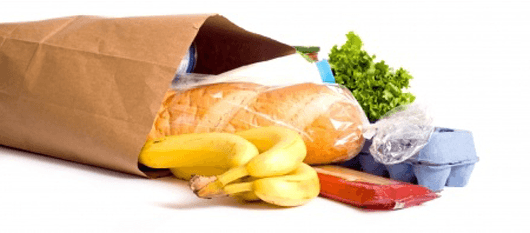Dear Members of the Legislature:
I write to you today, urging the elimination of the tax on groceries. I cite four reasons for doing so: 1) The tax on groceries disproportionately hurts working poor families; 2) Idaho’s low income levels make regressive taxes like sales taxes more onerous; 3) Increased economic activity will generate more jobs AND bring more revenue to state government; and 4) Disputes over the impact on the budget and savings for state government.
Taxes on Food Impact Working Poor Families the Hardest
The Tax Foundation showed that the bottom 20% of income earners pay 32 cents of every tax dollar on sales taxes, while the top 20% of income earners pay 8 cents of every tax dollar on sales taxes. In other words, the sales tax on food disproportionately impacts the working poor. This is one reason why only a handful of states still tax groceries. To be sure, working rich pay a disproportionate share of income taxes, however, that does not change the fact that sales taxes on things like food, hit working poor the hardest.
Additionally, the Institute on Taxation and Economic Policy showed Idahoans making less than $18,000 per year paid 5.9% of their income in sales and excise taxes, while people making more than $80,000 paid 2.6% of their income in sales and excise taxes in 2014.
The disproportionate impact of these regressive taxes on working poor families was one reason why the Food Bank of New York City resisted a special tax on beverages with sweeteners (the so called “soda tax”). The Food Bank cited the fact that some 40% of New Yorkers have difficulty “affording needed food.” Previous studies on products like tobacco show similar results, with the lowest income bracket paying three times the portion of the tax as those in the highest income brackets.
Idaho’s Low Incomes Make Regressive Taxes More Onerous
The per capita personal income of the average Idahoan was $37,533 in 2014. While this is up 5.3% from 2013, it remains at 81% of the national average and ranks us 46th in the nation. Idaho is also one of the top states for percentage of workers at or below the federal minimum wage – more than 7% of total workers. With so many Idahoans earning such a low wage, the strain to afford groceries is significant. In Kuna, for example, 44% of our schoolchildren are on free or reduced-cost school lunches due to low incomes. Many families don’t like to have to place their children on these federally run programs – program that didn’t recognize our white potato as “healthy.”
And while an annual tax credit of $80 to $120 (depending on status) is helpful, it does little to deal with the estimates of monthly grocery bills ranging from $172 to $339 per month for an adult 19-70 years old, according to the U.S. Department of Agriculture. Cutting the food bill of these and other families, in Kuna and across our state, by eliminating the tax on groceries would give them the sense they’re getting ahead, along with obtaining needed relief.
Jobs and Revenues Will Increase for Idaho’s Economy and Government
When people have extra money in their pockets they increase their spending. Some of that spending increase will be on goods subject to the sales tax. That means more tax revenue to the state. Moreover, that additional spending generates more economic activity, creating more jobs for other people. Those new jobs not only lead to even more spending, it also means more revenue to the state through income, property, and yes, sales taxes. This is true even if all the additional spending were to occur on groceries – an unrealistic assumption. Nevertheless, jobs would be created and additional revenue would go to the state.
Economists will disagree sharply on just how much new spending will come from this “wealth effect.” So, evidence here is hard to pin down. And, frankly, most government agencies tend to overstate the amount of additional spending they believe will occur. However, we can point to some proven data. When the federal government reduced income tax rates (under Presidents Coolidge, Kennedy, Reagan, and G.W. Bush) revenue to the federal government increased every time – from 11.8% to 99.4%. One can also find similar evidence when President Clinton lowered capital gains taxes in 1997. Reducing and simplifying taxes brings economic growth, higher spending, and more revenue to the government.
The bottom line is this: People change behavior when you change tax rates (and other costs). Whether it is a cut in tax rates or lower prices, people maximize their spending. It is why stores keep customers when they lower prices, why people work more when you give them more per hour (or a bonus) and why people spend more when you leave more money in their pocket.
Eliminating Tax on Groceries Won’t Necessarily “Bust the Budget”
There are some who argue that eliminating the tax on groceries will “bust” the state budget by a loss of $58 million. Yet, organizations like the Idaho Freedom Foundation have questioned these estimates.1 Their data show elimination of the tax could actually range from a loss of $26 million to a gain of nearly $5 million. Others, like Senators Bayer and Burgoyne have shown the impact to be about $26 million – much lower than the $58 million estimated by the state. And former Senator Russ Fulcher’s proposal last year could have returned $624 per year to each Idaho family. IFF’s data is particularly strong because it is based both on current Bureau of Labor Statistics and Census Bureau data, as well as actual results from Tennessee and Utah.
There is also the additional savings from the state not having to manage the program. Those who highlight the cost to the state also need to account for those savings.
At issue is whether those who properly worry about the loss of state revenue have adequate faith in Idahoans to be more active economically with an increase in income. First, economic recoveries that include higher incomes show the answer is yes. Second, and more importantly, Idaho’s state and local governments spend money on many ventures that come with large risks – from giving up tax revenue for future economic development to spending money on roads, schools, and other things – all with the assumption of more economic growth down the road. Weighed against the riskiness of some of these ventures, a small cut in taxes on groceries seems prudent.
Conclusion
The tax on groceries overwhelmingly burdens working poor Idahoans by requiring they pay a larger portion of their tax dollars on goods they must buy. Given all the other ways Idaho will gain in revenue and given the shortfall won’t be as bad as some claim, elimination of the grocery tax is a good way to boost both the incomes of working people, generate jobs through greater economic activity, and increase revenues to the state. As a citizen of Idaho, I ask that you consider eliminating the tax on groceries. Feel free to contact me with any questions and/or comments. Thank you for your time.
Sincerely,
Stephen M. Ackerman
208.860.8055
sackerman@cableone.net
[1] In full disclosure, I am a member of the Idaho Freedom Foundation’s Board of Scholars. However, I write to you as a citizen of Idaho. This letter has not been endorsed by IFF, its board, or any member of its staff.



